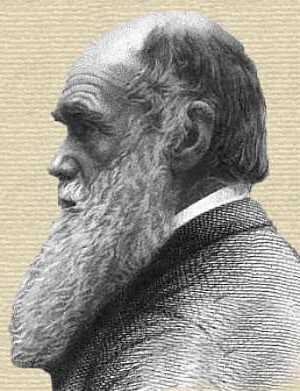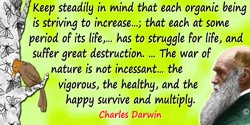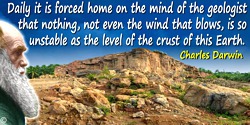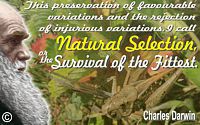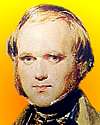 (source)
(source)
|
Charles Darwin
(12 Feb 1809 - 19 Apr 1882)
English naturalist who presented facts to support his theory of the mode of evolution whereby favourable variations would survive which he called 'Natural Selection' or 'Survival of the Fittest.'
|
[One letter stands out from the several thousand written by Charles Darwin in his lifetime. The letter, dated 5 Sep 1857, written from his home at Down, and sent to Asa Gray, contains his outline “on the means by which nature makes her species.” Darwin was aged 48 when he wrote this letter to the renowned botanist at Harvard University in the United States. With this letter, Darwin foreshadowed the publication of his great book, On the Origin of Species. The letter also fixed the date which established the priority of Charles Darwin for his great discovery. It was read at the Linnean Society, on 1 Jul 1858, as part of the presentation of the joint paper by Darwin and Alfred Russell Wallace, “On the Tendency of Species to form Varieties; and on the Perpetuation of Varieties and Species by Natural Means of Selection.” —Webmaster]
Letter to Asa Gray
5 September 18571
by Charles Darwin, from Down
[p.477] My Dear Gray,—I forget the exact words which I used in my former letter, but I dare say I said that I thought you would utterly despise me when I told you what views I had arrived at, which I did because I thought I was bound as an honest man to do so. I should have been a strange mortal, seeing how much I owe to your quite extraordinary kindness, if in saying this I had meant to attribute the least bad feeling to you. Permit me to tell you that, before I had ever corresponded with you, Hooker had shown me several of your letters (not of a private nature), and these gave me the warmest feeling of respect to you; and I should indeed be ungrateful if your letters to me, and all I have heard of you, had not strongly enhanced this feeling. But I did not feel in the least sure that when you knew whither I was tending, that you might not think me so wild and foolish in my views (God knows, arrived at slowly enough, and I hope conscientiously), that you would think me worth no more notice or assistance. To give one example: the last time I saw my dear old friend Falconer, he attacked me most vigorously, but quite kindly, and told me, “ You will do more harm than any ten Naturalists will do good. I can see that you have already corrupted and [p.478] half-spoiled Hooker!!” Now when I see such strong feeling in my oldest friends, you need not wonder that I always expect my views to be received with contempt. But enough and too much of this.
I thank you most truly for the kind spirit of your last letter. I agree to every word in it, and think I go as far as almost any one in seeing the grave difficulties against my doctrine. With respect to the extent to which I go, all the arguments in favour of my notions fall rapidly away, the greater the scope of forms considered. But in animals, embryology leads me to an enormous and frightful range. The facts which kept me longest scientifically orthodox are those of adaptation—the pollen-masses in asclepias — the mistletoe, with its pollen carried by insects, and seed by birds—the woodpecker, with its feet and tail, beak and tongue, to climb the tree and secure insects. To talk of climate or Lamarckian habit producing such adaptations to other organic beings is futile. This difficulty I believe I have surmounted. As you seem interested in the subject, and as it is an immense advantage to me to write to you and to hear, ever so briefly, what you think, I will enclose (copied, so as to save you trouble in reading) the briefest abstract of my notions on the means by which Nature makes her species. Why I think that species have really changed, depends on general facts in the affinities, embryology, rudimentary organs, geological history, and geographical distribution of organic beings. In regard to my Abstract, you must take immensely on trust, each paragraph occupying one or two chapters in my book. You will, perhaps, think it paltry in me, when I ask you not to mention my doctrine; the reason is, if any one, like the author of the ‘Vestiges,’ were to hear of them, he might easily work them in, and then I should have to quote from a work perhaps despised by naturalists, and this would greatly injure any chance of my views being received by those alone whose opinions I value. …2
[p.479] I. It is wonderful what the principle of Selection by Man, that is the picking out of individuals with any desired quality, and breeding from them, and again picking out, can do. Even breeders have been astonished at their own results. They can act on differences inappreciable to an uneducated eye. Selection has been methodically followed in Europe for only the last half century. But it has occasionally, and even in some degree methodically, been followed in the most ancient times. There must have been also a kind of unconscious selection from the most ancient times, namely, in the preservation of the individual animals (without any thought of their offspring) most useful to each race of man in his particular circumstances. The “roguing,” as nursery-men call the destroying of varieties, which depart from their type, is a kind of selection. I am convinced that intentional and occasional selection has been the main agent in making our domestic races. But, however this may be, its great power of modification has been indisputedly shown in late times. Selection acts only by the accumulation of very slight or greater varations, caused by external conditions, or by the mere fact that in generation the child is not absolutely similar to its parent. Man, by this power of accumulating variations, adapts living beings to his wants—he may be said to make the wool of one sheep good for carpets, and another for cloth, &c.
II. Now, suppose there was a being, who did not judge by mere external appearance, but could study the whole internal organisation—who never was capricious—who should go on selecting for one end during millions of generations, who will say what he might not effect! In nature we have some slight variations, occasionally in all parts: and I think it can be shown that a change in the conditions of existence is the main cause of the child not exactly resembling its parents; and in nature, geology shows us what changes have taken place, and are taking place. We have almost unlimited time: no one but a practical geologist can fully appreciate this: think of the Glacial period, during the whole of which the [p.480] same species of shells at least have existed; there must have been during this period, millions on millions of generations.
III. I think it can be shown that there is such an unerring power at work, or Natural Selection (the title of my book), which selects exclusively for the good of each organic being. The elder De Candolle, W. Herbert, and Lyell, have written strongly on the struggle for life; but even they have not written strongly enough. Reflect that every being (even the elephant) breeds at such a rate that, in a few years, or at most a few centuries or thousands of years, the surface of the earth would not hold the progeny of any one species. I have found it hard constantly to bear in mind that the increase of every single species is checked during some part of its life, or during some shortly recurrent generation. Only a few of those annually born can live to propagate their kind. What a trifling difference must often determine which shall survive and which perish!
IV. Now take the case of a country undergoing some change; this will tend to cause some of its inhabitants to vary slightly; not but what I believe most beings vary at all times enough for selection to act on. Some of its inhabitants will be exterminated, and the remainder will be exposed to the mutual action of a different set of inhabitants, which I believe to be more important to the life of each being than mere climate. Considering the infinitely various ways beings have to obtain food by struggling with other beings, to escape danger at various times of life, to have their eggs or seeds disseminated, &c., &c., I cannot doubt that during millions of generations individuals of a species will be born with some slight variation profitable to some part of its economy; such will have a better chance of surviving, propagating this variation, which again will be slowly increased by the accumulative action of natural selection; and the variety thus formed will either coexist with, or more commonly will exterminate its parent form. An organic being like the woodpecker, or the mistletoe, may thus come to be adapted to a score of [p.481] contingencies; natural selection, accumulating those slight variations in all parts of its structure which are in any way useful to it, during any part of its life.
V. Multiform difficulties will occur to every one on this theory. Most can, I think, be satisfactorily answered.— “Natura non. facit saltum “ answer some of the most obvious. The slowness of the change, and only a very few undergoing change at any one time answers others. The extreme imperfections of our geological records answers others.
VI. One other principle, which may be called the principle of divergence, plays, I believe, an important part in the origin of species. The same spot will support more life if occupied by very diverse forms: we see this in the many generic forms in a square yard of turf (I have counted twenty species belonging to eighteen genera), or in the plants and insects, on any little uniform islet, belonging to almost as many genera and families as to species. We can understand this with the higher animals, whose habits we best understand. We know that it has been experimentally shown that a plot of land will yield a greater weight, if cropped with several species of grasses, than with two or three species. Now every single organic being, by propagating rapidly, may be said to be striving its utmost to increase in numbers. So it will be with the offspring of any species after it has broken into varieties, or sub-species, or true species. And it follows, I think, from the foregoing facts, that the varying offspring of each species will try (only a few will succeed) to seize on as many and as diverse places in the economy of nature as possible. Each new variety or species when formed will generally take the place of, and so exterminate its less well-fitted parent. This, I believe, to be the origin of the classification or arrangement of all organic beings at all times. These always seem to branch and sub-branch like a tree from a common trunk; the flourishing twigs destroying the less vigorous—the dead and lost branches rudely representing extinct genera and families.
This sketch is most imperfect; but in so short a space [p.482] I cannot make it better. Your imagination must fill up many wide blanks. Without some reflection, it will appear all rubbish; perhaps it will appear so after reflection.
C. D.
P.S.—This little abstract touches only the accumulative power of natural selection, which I look at as by far the most important element in the production of new forms. The laws governing the incipient or primordial variation (unimportant except as the groundwork for selection to act on, in which respect it is all important), I shall discuss under several heads, but I can come, as you may well believe, only to very partial and imperfect conclusions.
[The joint paper of Mr. Wallace and my father was read at the Linnean Society on the evening of July 1st. Sir Charles Lyell and Sir J. D. Hooker were present, and both, I believe, made a few remarks, chiefly with a ‘view of impressing on those present the necessity of giving the most careful consideration to what they had heard. There was, however, no semblance of a discussion. Sir Joseph Hooker writes to me: “The interest excited was intense, but the subject was too novel and too ominous for the old school to enter the lists, before armouring. After the meeting it was talked over with bated breath: Lyell’s approval, and perhaps in a small way mine, as his lieutenant in the affair, rather overawed the Fellows, who would otherwise have flown out against the doctrine. We had, too, the vantage ground of being familiar with the authors and their theme.”]
[Notes by Webmaster: The last paragraph above and the footnotes below, were written by Francis Darwin (son of Charles Darwin. He was the editor of the published letters of Charles Darwin. The July 1st date in the final paragraph refers to 1858. Webmaster gave the numbers to the footnotes gathered below, from pages 477 and 478 of the original text.]
1 The date is given as October in the ‘Linnean Journal.’ The extracts were printed from a duplicate undated copy in my father’s possession, on which he had written, “ This was sent to Asa Gray 8 or 9 months ago, I think October 1857.
2 Here follows a discussion on “large genera varying,” which has no direct connection with the remainder of the letter.
- Science Quotes by Charles Darwin.
- 12 Feb - short biography, births, deaths and events on date of Darwin's birth.
- Charles Darwin - Earthquake observation on 20 Feb 1835, during the voyage of the Beagle.
- Charles Darwin - context of quote “If the misery of our poor be caused not by the laws of nature…” - Medium image (500 x 350 px)
- Charles Darwin - context of quote “If the misery of our poor be caused not by the laws of nature…” - Large image (800 x 600 px)
- Charles Darwin - context of quote “Improving…a young naturalist” - Medium image (500 x 350 px)
- Charles Darwin - context of quote “Improving…a young naturalist” - Large image (800 x 600 px)
- Charles Darwin - context of quote “Great is the power of steady misrepresentation” - Medium image (500 x 350 px)
- Charles Darwin - context of quote “Great is the power of steady misrepresentation” - Large image (800 x 600 px)
- Charles Darwin - context of quote “This…I call Natural Selection, or the Survival of the Fittest” - Medium image (500 x 350 px)
- Charles Darwin - context of quote “This…I call Natural Selection, or the Survival of the Fittest” - Large image (800 x 600 px)
- From So Simple a Beginning: Darwin's Four Great Books, by Charles Darwin, Edward O. Wilson. - book suggestion.
- Booklist for Charles Darwin.
